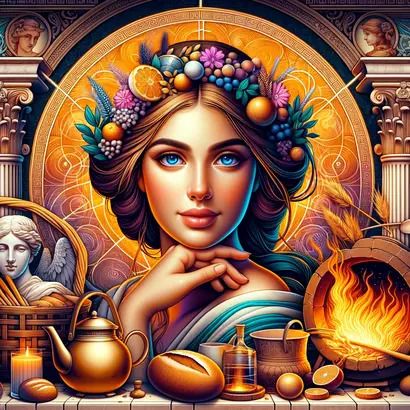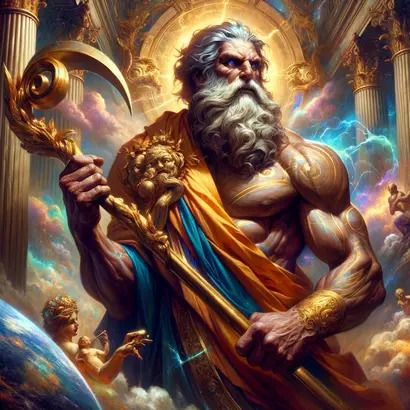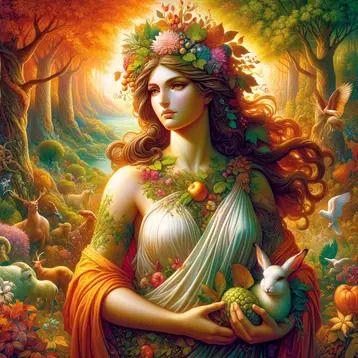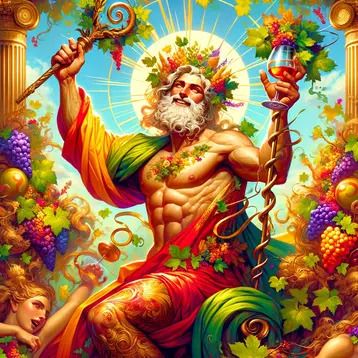
Hestia
🏠 Hestia :: Greek Goddess of the Hearth
Hestia is the Greek goddess of the hearth, one of the original Twelve Olympians. Cronus’ and Rhea’s first-born child, she was pure and peaceful. However, since she always had to stay at home, tending the fireplace, Hestia is not involved in many myths. Consequently, at a later stage, she would be replaced in the Pantheon with the much wilder Dionysus.
Hestia’s Role
Hestia's Name
Hestia’s name means “hearth” or “fireplace,” and her status shows how important the hearth was in the social and religious life of Ancient Greeks. Making and preserving fire was both essential and difficult for more primitive societies, which made the household fire a sacred element at a very early stage of history. In later days, Hestia became its embodiment.
Hestia's Portrayal and Symbolism
However, there are very few pictorial representations of Hestia. Usually, she is portrayed as a modest middle-aged veil-wearing woman. Sometimes, she stands by a large fire, carrying a staff or holding some flowers in her hands.
Hestia's Epithets
The Ancient Greeks didn’t use too many epithets to describe her. “Beloved,” “Eternal,” and “She of the public hearth” were probably the most common.
Hestia’s Family
Hestia was the first-born child of the Titans Cronus and Rhea. Since she was also the first one to be swallowed at birth by her father – and, consequently, the last one to be disgorged – Hestia was oftentimes called the youngest of Cronus and Rhea’s children.
She had two sisters – Demeter and Hera – and three brothers: Hades, Poseidon, and Zeus.
Hestia’s Virginity, Peacefulness, and Domesticity
The Vow of Chastity
Since fire is a pure and a purifying element, Hestia was worshipped as a virgin goddess. And they say that she became a virgin in order to keep the peace at Olympus. Namely, both Apollo and Poseidon wanted to marry her; fearing that choosing either of them may result in turmoil, Hestia swore to an eternal virginity by placing her hand on Zeus’ head. As a reward for maintaining the order and in place of marriage, Zeus granted her the central place in the house and the first and richest portion of humans’ divine offerings.
Hestia, Priapus, and the Donkey
Only once was Hestia’s chastity subsequently put in danger. At a rustic feast, the drunken god of fertility Priapus tried to rape the sleeping goddess. Fortunately, a donkey started braying and woke up both Hestia and the guests, who chased Priapus away in contempt. Ever since, donkeys were rested and garlanded on Hestia’s feast-day.
Hestia at Home
Gentle and peace-loving, Hestia doesn’t appear in too many myths other than these two. Plato says that this is because she has to remain in the house of the gods, all alone, tending the eternal celestial fire even when all the other Olympians ritually pass in processions through heavens. This is both her privilege and her predicament.
Consequently, Hestia’s only manifestation among humans was the crackling of the fire. Aristotle says that it is the sound of the goddess laughing.
Hestia: Myths and Hidden Truths
Despite her crucial role in the lives of the Ancient Greeks, Hestia is often overlooked or misunderstood. A common misconception is that she was a minor goddess, when in fact, she was one of the original Twelve Olympians. Her importance is frequently underestimated, as the hearth and home were central to the daily lives of the Greeks, serving as a gathering place for families and a symbol of unity. Finally, Hestia is sometimes mistakenly considered a passive or weak goddess due to her non-confrontational nature. However, her commitment to peace and harmony represents strength and resilience in the face of potential conflict and chaos.
Hestia and the Olympic Games
The hearth in the sanctuary of Hestia at Olympia played a crucial role in the Olympic Games. Athletes would light their torches from Hestia's sacred flame and carry them back to their home cities, spreading the spirit of unity and sportsmanship.
Hestia's Offerings
As the goddess of the hearth, Hestia was often honored with the first and last offerings at feasts and sacrifices. These offerings typically included wine, oil, and portions of the sacrificed animals.
Hestia: Embracing the Warmth of the Hearth and the Heart
As we explore the tranquil realm of Hestia, the Greek goddess of the hearth, we come to appreciate the significance of her role in the daily lives of the Ancient Greeks. Hestia's steadfast dedication to her duties, as well as her commitment to peace and purity, reflect the essential nature of fire as both a life-giving and purifying force. Her story, though seldom told, serves as a gentle reminder of the importance of warmth, comfort, and community in our own lives. In today's fast-paced world, we could all benefit from embracing the virtues of Hestia, focusing on the simple joys of home and the connections that bind us together.
Sources
You can read the myth about Hestia’s vow to remain a virgin in the 5th Homeric Hymn dedicated to Aphrodite, starting at verse 21 and ending at 32. Both the 24th and 29th Homeric Hymn are dedicated exclusively to her. Pindar evokes Hestia in few beautiful verses – the first seven in his 11th Nemean Ode.
Hestia Video
Hestia Q&A
Link/Cite Hestia Page
Written by: The Editors of GreekMythology.com. GreekMythology.com editors write, review and revise subject areas in which they have extensive knowledge based on their working experience or advanced studies.
For MLA style citation use: GreekMythology.com, The Editors of Website. "Hestia". GreekMythology.com Website, 19 Apr. 2023, https://www.greekmythology.com/Olympians/Hestia/hestia.html. Accessed 26 April 2024.




